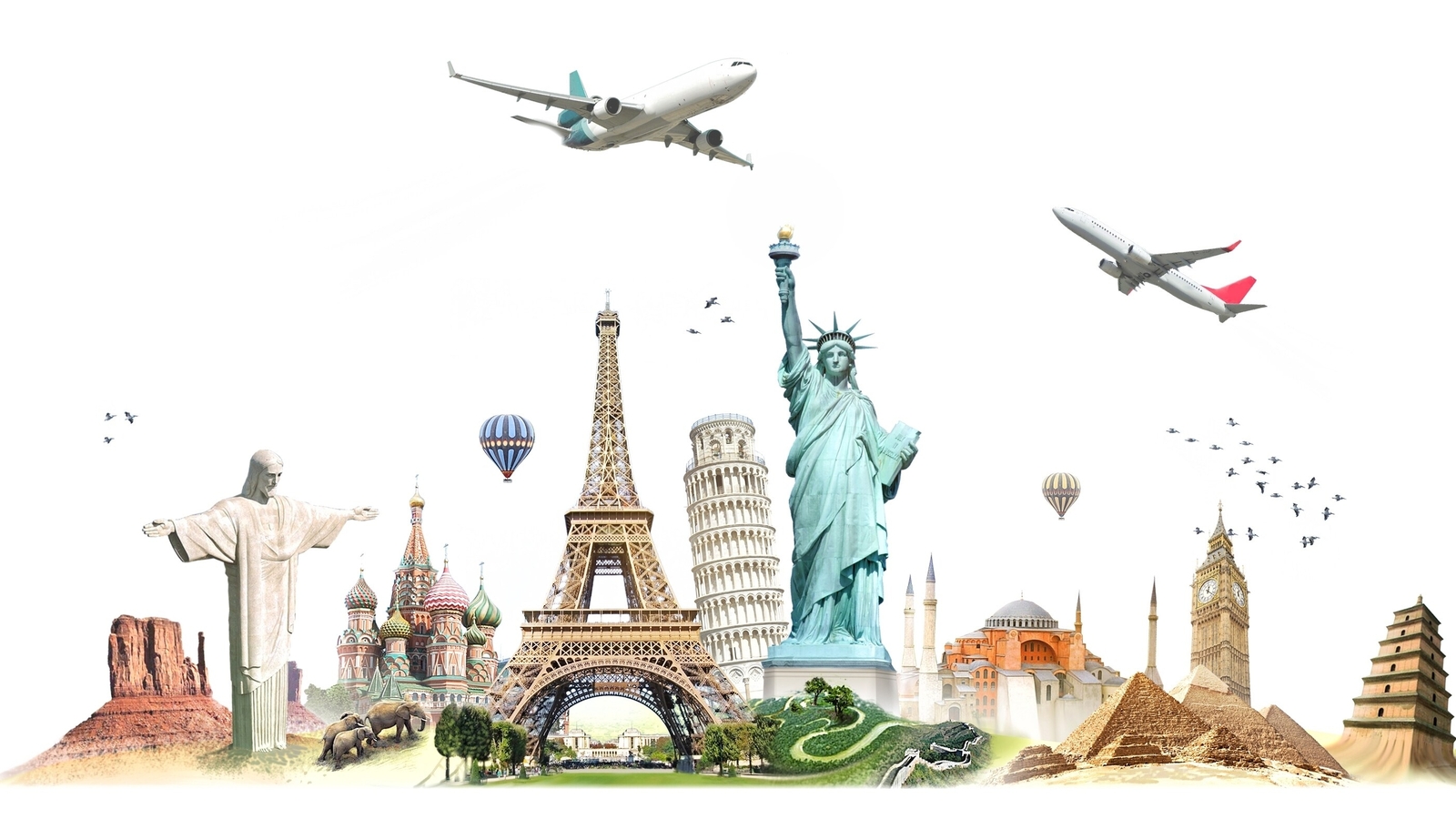Moldova and Georgia: Two pivotal votes on their future in Europe
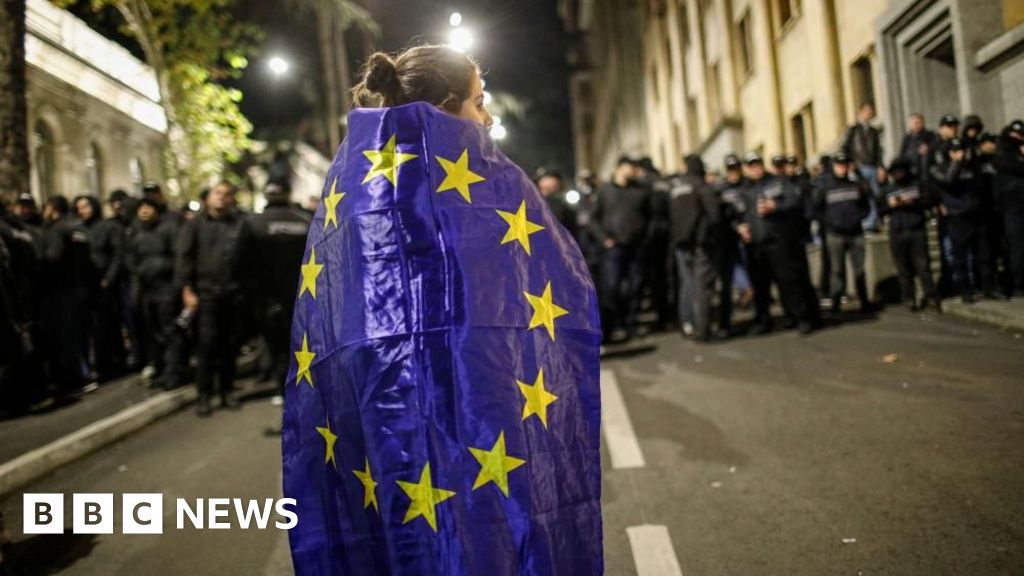
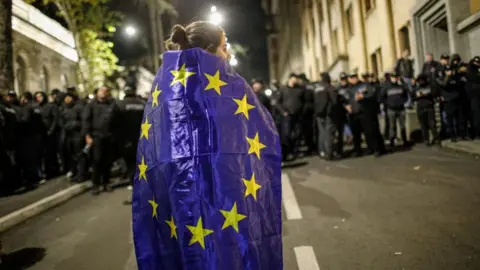 DAVID MDZINARISHVILI/EPA-EFE
DAVID MDZINARISHVILI/EPA-EFEMoldovans hold a decisive presidential run-off vote on Sunday, a week after a disputed election in Georgia – with both elections seen as decisive for their future paths in Europe.
Both states have felt the shadow of alleged Russian interference, and both are former Soviet republics.
Moldovans have already voted in an October referendum marred by allegations of vote-buying.
And Georgia’s election authorities have handed victory to its increasingly authoritarian government, in a vote overshadowed by widespread violations before and during the vote.
Moldova’s crucial run-off
Pro-EU President Maia Sandu goes into a tight run-off race to secure a second term on Sunday, having fallen short of the 50% she needed in the first round.
She kick-started Moldova’s talks on joining the EU this year, and secured 42% of the vote on the same day that Moldovans voted by a whisker to enshrine Moldova’s path to EU membership in the constitution: 50.38% voted Yes and 49.62% No.
The narrow margin came as a surprise to many, as several surveys had suggested more than 60% of voters would back the referendum.
Sandu said without the bribery “we would have had a convincing victory in the presidential election and the referendum”.
Moldovan police said over the past two months fugitive pro-Russian businessman Ilan Shor had moved $39m (£30m) into Moldovan bank accounts in a Russian vote-buying scheme.
Now thought to be in Russia, Shor has loomed large over Moldova’s votes but denies wrongdoing. In September, he offered money to convince “as many people as possible” to vote No or to abstain in the EU referendum.
Chief of police Viorel Cernauteanu said police and prosecutors had found that attempts to bribe voters had begun months ago, and that at least 138,000 Moldovans had benefited from the cash.
Before the vote, Mr Cernauteanu alleged that dozens of Moldovans had recently travelled to Moscow, ostensibly to attend “cultural exchange programmes”, but actually receiving training to stir violence ahead of the elections.
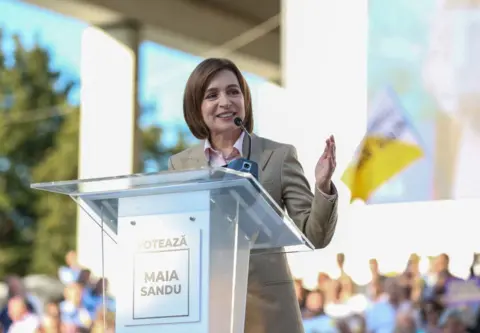 Getty Images
Getty ImagesMaia Sandu, 52, founded Moldova’s liberal Party of Action and Solidarity and faces off in the 3 November presidential run-off against former prosecutor general Alexander Stoianoglo, who came second with about 26% of the vote.
Stoianoglo denies links to Shor but he is backed by the pro-Russian Party of Socialists, whose leader is ex-president and popular opposition figure Igor Dodon.
He took many by surprise when he announced he was running for president in July and may secure the support of other candidates knocked out of the race.
Third-placed candidate Renato Usatii has said he will back neither Sandu nor Stoianoglu, throwing the race wide open.
Moldova’s population is just over 2.5 million, while 1.2 million Moldovans live abroad.
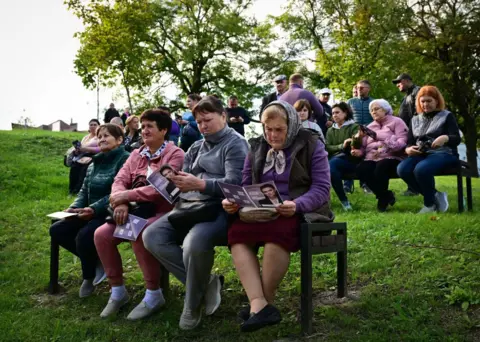 Getty Images
Getty ImagesEven if Sandu does win a second term, parliamentary elections next July look difficult for her party, which may have to work with less staunchly pro-EU forces if it wants to govern.
The Kremlin has denied meddling in Moldova. However, even before the vote many in the pro-European camp had denounced what they said were Russian efforts to spread disinformation and influence the vote.
Last year he was sentenced to 15 years in jail in absentia last year for involvement in the theft of $1bn from three Moldovan banks, which triggered massive anti-government rallies in Moldova.
Ilan Shor’s party was banned in Moldova last year following allegations of working with Russia to undermine Moldova’s security and constitutional order.
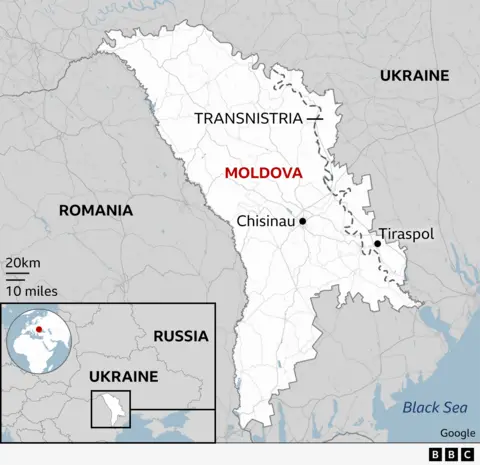
Although the Kremlin maintains it “does not interfere in other people’s affairs”, pro-European forces in Moldova have long warned of Russian interference in the election and referendum vote.
Russia still has a military base in the breakaway Moldovan region of Transnistria along Moldova’s border with Ukraine, and there is also an autonomous Russian-speaking region called Gagauzia.
The governor there, Eugenia Gutul, is an active supporter of Vladimir Putin and has been sanctioned by the EU for threatening Moldova’s independence.
Authorities have linked some cases of vandalism and disinformation campaigns on social media to Ilan Shor and to his alleged Kremlin backers.
Georgia’s ‘stolen’ election overshadowed by violations
It was only last December that Georgians were celebrating the EU granting their country official candidate status, with polls suggesting support from at least 80% of Georgians.
But when the ruling Georgian Dream brought in Russian-style laws targeting media and non-government groups, that bid to join the EU was frozen.
The law requires media and NGOs with foreign funding to register as acting in the interest of a foreign power. Georgian Dream has also enacted a law curbing LGBT rights.
Four opposition groups framed the vote as a choice of Europe or Russia when this polarised country of 3.7 million people voted in parliamentary elections on 26 October.
They were confident of victory and two Western exit polls for opposition TV channels suggested they had won.
Little over an hour later, Georgia’s election commission handed victory – and a fourth term – to Georgian Dream.
The opposition said the election had been stolen and pro-Western President Salome Zourabichvili spoke of a “Russian special operation”.
Georgian Dream’s founder Bidzina Ivanishvili made his fortune in Russia in the 1990s, and his party framed the vote as a choice between peace with them, or a new war with Russia with the opposition.
The Kremlin insists it had no desire or intention to meddle in the vote, and it has has accused the West of blatantly trying to put pressure on Georgia.
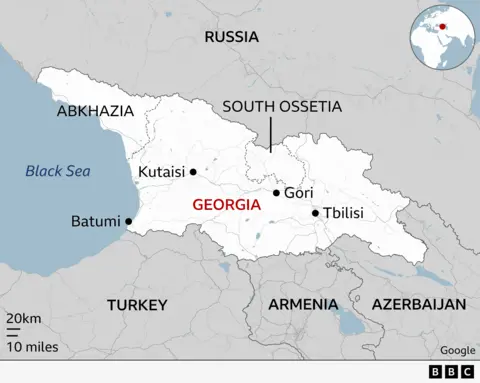
Georgian Dream maintains it is still on the path to joining the EU, and welcomed Hungary’s Viktor Orban to Tbilisi two days after the vote.
But the EU made clear Orban, who is considered Russia’s closest partner in the union, was not representing the 27 member states.
Orban’s arrival coincided with mounting examples of election violations, both before and on the day of the election.
My Vote, a Georgian umbrella group of 1,500 observers, documented details of intimidation, vote-buying and ballot-stuffing.
Multiple allegations focused on the new electronic voting systems. Voters had been able to use other people’s ID numbers to cast their ballots with the complicity of election officials, My Vote alleged.
Georgia’s election commission accused its critics of a “manipulative campaign” of disinformation and said it would recount about 14% of the vote.
Georgia’s prime minister, Irakli Kobakhidze, insisted the vote was broadly in line with legal principles and denied his government was pro-Russian.
Only a handful of countries have since recognised the election, with the EU, US and Nato calling for a transparent inquiry into what happened.
US President Joe Biden said he had been “deeply alarmed by [Georgia’s] recent democratic backsliding”. Ahead of the election he withdrew an invitation to Georgia’s prime minister to attend a reception.
Georgian Dream has been in power since 2012 and had been keen to secure a majority big enough to change the constitution so it could impose a ban on opposition groups. According to the election commission it won almost 54%, which was not enough to make constitutional change.
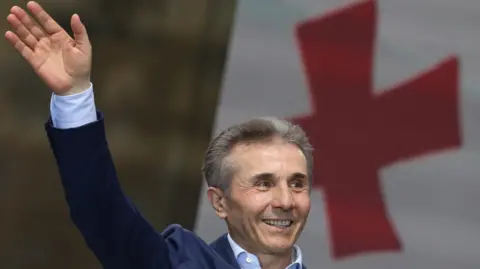 Reuters
ReutersAs in the case of Moldova, observers highlighted a significant Russian anti-European disinformation campaign ahead of the vote.
The Kremlin had also spoken of “normalising relations” with Tbilisi, which has avoided imposing sanctions on Russia, arguing it would severely harm the local economy.
For most Georgians there is a deep distrust of Russia, which fought a five-day war with Georgia in 2008 and still occupies two breakaway Georgian regions – Abkhazia and South Ossetia ,which make up 20% of Georgian territory.
However, Georgian Dream’s campaign focused heavily on the choice of peace or war, raising the unfounded prospect of the opposition involving Georgia in a new Western front in the war in Ukraine.
Related
European leaders push defense spend amid uncertainty over Trump aid…
This week, the European Commission proposed measures for fiscal flexibility on defense spending and a plan to borrow 150 billion euros ($163 b
Europe rallies behind Zelensky as US announces new talks with…
EU leaders rallied around Ukraine and agreed to boost the bloc's defences at a crisis summit Thursday, as Washington said talks with Kyiv were back on track
European markets recoup most losses; Autos gain on tariff exemption
This was CNBC's live blog covering European markets. European markets ended around the flatline on Thursday after a choppy day of trading as i
Jesse Eisenberg Granted Polish Citizenship: ‘I Am Happy to Be…
Jesse Eisenberg has been granted Polish citizenship by the European country’s president, just months after the actor, writer and director applied.Eisenberg wa


